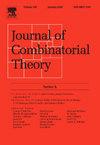Quasimodular forms arising from Jacobi's theta function and special symmetric polynomials
IF 1.2
2区 数学
Q2 MATHEMATICS
引用次数: 0
Abstract
Ramanujan derived a sequence of even weight 2n quasimodular forms from derivatives of Jacobi's weight 3/2 theta function. Using the generating function for this sequence, one can construct sequences of quasimodular forms of all nonnegative integer weights with minimal input: a weight 1 modular form and a power series . Using the weight 1 form and , we obtain a sequence of weight n quasimodular forms on whose symmetric function avatars are the symmetric polynomials that arise naturally in the study of syzygies of numerical semigroups. With this information, we settle two conjectures about the . Finally, we note that these polynomials are systematically given in terms of the Borel-Hirzebruch -genus for spin manifolds, where one identifies power sum symmetric functions with Pontryagin classes.
由雅可比函数和特殊对称多项式引起的拟模形式
Ramanujan从Jacobi的权值3/2函数的导数中导出了一个偶数权值2n的拟模形式U2n(q)的序列。利用该序列的生成函数,可以构造具有最小输入的所有非负整数权的准模形式序列:权1模形式和幂级数F(X)。利用权值为1的形式θ(q)2和F(X)=exp (X/2),在Γ0(4)上得到了一个权值为n的拟模形式序列{Yn(q)},其对称函数元Y ~ n(xk)是研究数值半群协同时自然产生的对称多项式Tn(xk)。有了这些信息,我们确定了关于Tn(xk)的两个猜想。最后,我们注意到这些多项式是系统地用自旋流形的Borel-Hirzebruch A -格给出的,其中人们用Pontryagin类识别幂和对称函数pi。
本文章由计算机程序翻译,如有差异,请以英文原文为准。
求助全文
约1分钟内获得全文
求助全文
来源期刊
CiteScore
2.90
自引率
9.10%
发文量
94
审稿时长
12 months
期刊介绍:
The Journal of Combinatorial Theory publishes original mathematical research concerned with theoretical and physical aspects of the study of finite and discrete structures in all branches of science. Series A is concerned primarily with structures, designs, and applications of combinatorics and is a valuable tool for mathematicians and computer scientists.

 求助内容:
求助内容: 应助结果提醒方式:
应助结果提醒方式:


